WW hosts the Sixth Field Dialogue for Interests in Investing in Locally Controlled Forests
- Wildlife Works
- Dec 5, 2010
- 4 min read
Updated: Aug 5, 2024
By Jimmy Eggers, Wildlife Works Special Projects
Wildlife Works hosts the Sixth Field Dialogue for Interests in Investing in Locally Controlled Forests Sponsors include Wildlife Works, Nedbank
As the owners and protector-operators of the Africa’s first carbon offset project under the new (2009) REDD guidelines, Wildlife Works was happy to recently host members of The Forests Dialogue (TFD) on November 29, 2010. There were some 47 members from all parts of the world, including Canada, the USA, Scandanavia, Europe, Asia, Central America, South America, and Africa.
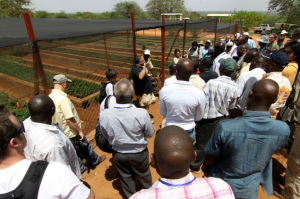
Rod Dodson, VP of African Field Operations, led the Rukinga tour.
Delightfully, these travelers were able to mingle and exchange ideas with the chiefs and directors of the very communities adjacent to and supporting our REDD+ related efforts. Kenyan governmental ministries were also well represented. It was a wonderful opportunity for all of these persons that subscribe to and live by the TFD’s broad credo of diverse peoples being committed to the conservation and sustainable use of the world’s forest.
Even better, with this event being tagged as the Sixth Field Dialoguefor those interested in idea of local people Investing in Locally Controlled Forestry (ILCF) – whether they be small landholders, community peoples, indigenous forest-dependent people, or persons like WWC owners and employees – the commonality was bright and perceptible.
Although TFD’s schedule included a day on site with us on the Rukinga Wildlife Sanctuary in southwestern Kenya, it also included trips to both Northern and Southern Kenyan coastal forest preserves, providing the group unusual diversity for a single trip.
The group assembled in the Wildlife Works eco factory shortly after arrival on the Rukinga Sanctury grounds. They were first welcomed and then given an overview of the full range of WildLife Works activities by VP of African Field Operations, Rob Dodson. TFD executive director Gary Dunning then reinforced the principles of The Forest Dialogue and reminded the group of the extraordinary parallels guiding both TFD’s and the REDD program’s work.
The next stop at the Wildlife Works seedling nursery and greenhouse seemed to generate a lot of curiosity and a very broad range of questions for the presenters of the seedling programs. Of special interest seemed to be our community seedling buying program whereby very small seedlings of many different species are brought to us by community members in small containers.
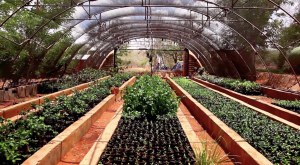
There was particularly keen interest from the group about our seedling purchase program offered to community members. The seedlings are often used in restoration programs a year later, as part of Wildlife Works’ community reinvestment.
The “sellers” are paid an advertised amount for each seedling. These seedlings then are cultured and grown for a year under our protective nursery conditions, then in turn redistributed throughout area communities for use in tree planting programs. These help the entire region recover from decades of deforestation for human consumption. Some purchased seedlings will be used in our own treefarm activities mentioned below.
Everyone present, no matter where they are from, seemed to be very aware of the deleterious effect of hardwood charcoaling in regions where charcoal is the primary cooking fuel. In our region of east Africa, it is probably a larger source of deforestation than clearing for subsistence agriculture. Jamie Hendriksen, WWC’s Rukinga field operations manager, described for the group Wildlife Works’ new effort to produce sustainable or green charcoal by using coppiced or pruned branches from Acacia species indigenous to our area.
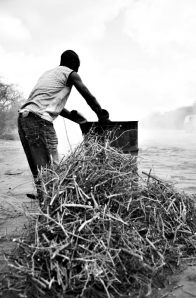
Sustainable or green charcoal: coppiced or pruned branches from Acacia species indigenous to our area. photo by www.peterzjones.com
These are raised on “treefarm” plots now being started on appropriate non-carbon project ground and charred by a barrel-kiln charring process found to be much more efficient than the bush ground kiln processes. Fingerling branches can be harvested every year – with no trees cut. Wildlife Works is hopeful this will eventually replace illegal bush charcoaling while providing even more jobs to community peoples. All seemed to enjoy witnessing the actual barrel-kiln charring process.
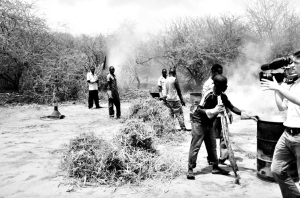
barrel-kiln charring process has been found to be much more efficient than the bush ground kiln processes. photo by www.peterzjones.com
We all enjoyed lunch prepared by and served Camp Kenya safari camp, a long time safari concession operated on the Rukinga Sanctury, now operated by Camps International (CI). It was announced that CI was this year’s winner of EcoTourism Kenya’s Eco-Warrior Award, and we all congratulated them on that. Another extensive question and answer session involving almost everyone in attendance concluded the session. A serious flurry of contact info exchange preceded the conferees loading onto the buses by 4 PM for the substantial journey back to Mombasa for a dinner conference that evening and field trips the following two days.
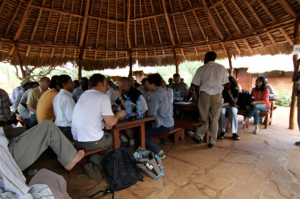
Camp Kenya
* * * * * * * * *
Wildlife Works is the world’s leading REDD+ (Reducing Emissions from Deforestation and Degradation), project development and management company with an effective approach to applying innovative market based solutions to the conservation of biodiversity. REDD+ was originated by the United Nations (UN) to help stop the destruction of the world’s forests.
Over a 15 year history Wildlife Works established a successful model that uses the emerging marketplace for REDD+ Carbon Offsets to protect threatened forests, wildlife, and communities.
The company helps local landowners in the developing world monetize their forest and biodiversity assets whether they are governments, communities, ownership groups, or private individuals.



